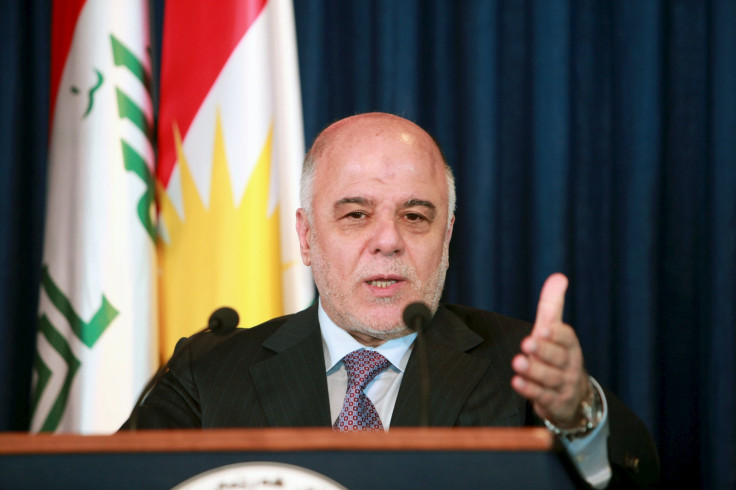Haider Al-Abadi To Seek More US Aid In Fight Against ISIS During First Washington Visit

Iraqi Prime Minister Haider al-Abadi is expected to seek billions of dollars in U.S. aid, arms and training on his first visit to the White House on Tuesday. Speaking to reporters on Monday, ahead of his trip to Washington, al-Abadi said that Iraq needs greater international support to “finish” the Islamic State group in the country.
“If there are specific ideas that Prime Minister Abadi has for stepped-up assistance, then we'll obviously consider them seriously,” White House Press Secretary Josh Earnest reportedly said on Monday. “Our success in working with an inclusive Iraqi government has been important to some of the security gains that Iraq has realized against ISIL in the last few months.”
Al-Abadi’s visit comes at a time when the Iraqi army, aided by Iran-backed Shiite militias, has wrested control of several key regions from the Islamic State group. In late March, Iraqi troops and allied militias, aided by U.S. airstrikes, “liberated” the city of Tikrit, located about 140 miles northwest of Baghdad. However, ISIS still controls large swathes of territory in the country’s north, including the city of Mosul.
“More efforts to organize, arm and integrate the Sunnis willing to fight ISIL are going to be needed in the months ahead to liberate Anbar and Mosul,” U.S. Vice President Joe Biden reportedly said last week.
Since the start of the anti-ISIS campaign in Syria and Iraq last summer, the U.S. has carried out nearly 2,000 airstrikes in Iraq. In November last year, U.S. President Barack Obama also authorized the deployment of 1,500 American troops to Iraq, a move that would increase the number of U.S. troops in the country to 3,100. The Pentagon has also requested Congress for $1.6 billion to fund the training and arming of Iraqi and Kurdish forces.
“The U.S. is not going to be willing to step up in terms of major military support. It's unclear that the U.S. can budget for major aid,” Anthony Cordesman, a foreign policy expert at the Center for Strategic & International Studies in Washington, told Reuters.
However, given that the Iraqi government is facing a budget deficit of nearly $21 billion this year, thanks to a drastic decline in oil prices, Iraqi officials have hinted that they could turn to Iran for help if the U.S. fails to provide aid.
“If that’s not available, we’ve already done it with the Iranians and others,” an Iraqi official, speaking on the condition of anonymity, told Reuters.
© Copyright IBTimes 2024. All rights reserved.












